

The Historical Mission of Our Time. Whistleblowers. James Baldwin. Aaron Swartz. POLITICAL THEORY - Karl Marx. Arturo Escobar: a post-development thinker to be reckoned with. One response to the development impasse caused by modernisation and dependency theories was "can do" neoliberalism; another involved reflection on the very purpose of development.
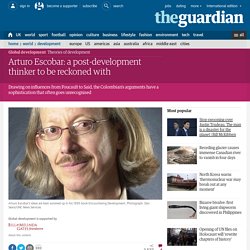
This took shape across "alternative" approaches including environment, gender and sustainability. All these approaches grew up alongside the neoliberal right, but most were drowned out, for a time at least, by its noisiness. Perhaps the most distinctive new approach, however – one set on meeting the new right's noisiness with a strategic and all-encompassing silence – was the post-development thinking embodied by the work of Colombian scholar Arturo Escobar. Escobar's ideas are best summed up in his 1995 book Encountering Development, which offered much more than an analysis of mainstream development economics or the sprawling array of development actors and institutions it spawned. But what exactly did he mean? Meet Alexandra Elbakyan, the researcher who's breaking the law to make science free for all.
How the Government Tracks You: NSA Surveillance. Mark Boyle (Moneyless Man) Mark Boyle aka The Moneyless Man (born 8 May 1979) is an Irish activist and writer best known for founding the online Freeconomy Community, and for living without money since November 2008.[1] Boyle writes regularly for the Freeconomy Blog and British newspaper The Guardian.
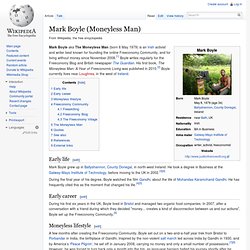
His first book, The Moneyless Man: A Year of Freeconomic Living was published in 2010.[2] Boyle currently lives near Loughrea, in the west of Ireland. Mark Boyle grew up in Ballyshannon, County Donegal, in north-west Ireland. He took a degree in Business at the Galway-Mayo Institute of Technology, before moving to the UK in 2002.[3][4] During his first six years in the UK, Boyle lived in Bristol and managed two organic food companies. In 2007, after a conversation with a friend during which they decided "money... creates a kind of disconnection between us and our actions", Boyle set up the Freeconomy Community.[6] Later in the same year, Boyle developed an alternative plan: to live without money entirely. Kevin Zeese. Kevin Zeese marching in the Dundalk, Maryland Independence Day parade.
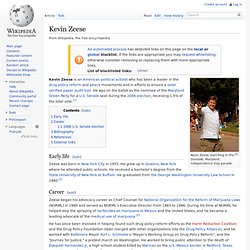
Kevin Zeese is an American political activist who has been a leader in the drug policy reform and peace movements and in efforts to ensure a voter verified paper audit trail. He was on the ballot as the nominee of the Maryland Green Party for a U.S. Senate seat during the 2006 election, receiving 1.5% of the total vote.[1] Early life[edit] Zeese was born in New York City in 1955.
Career[edit] Zeese began his advocacy career as Chief Counsel for National Organization for the Reform of Marijuana Laws (NORML) in 1980 and served as NORML's Executive Director from 1983 to 1986. David Swanson. David Swanson in 2012 David Swanson (born 1969) is an American activist, blogger and author.
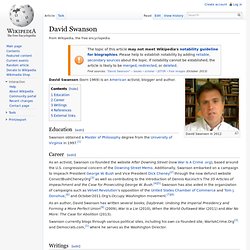
Education[edit] Swanson obtained a Master of Philosophy degree from the University of Virginia in 1997.[1] Career[edit] As an activist, Swanson co-founded the website After Downing Street (now War Is A Crime .org), based around the U.S. congressional concern of the Downing Street Memo. As an author, David Swanson has written several books; Daybreak: Undoing the Imperial Presidency and Forming a More Perfect Union[9] (2009), War Is a Lie (2010), When the World Outlawed War (2011) and War No More: The Case for Abolition (2013).
Swanson currently blogs through various political sites, including his own co-founded site, WarIsACrime.Org[3] and Democrats.com,[1] where he serves as the Washington Director. Writings[edit] Kucinich, Dennis J., David C.N. References[edit] External links[edit] Chris Hedges. Christopher Lynn "Chris" Hedges (born September 18, 1956) is an American journalist specializing in American politics and society.

Hedges is also known as the best-selling author of several books including War Is a Force That Gives Us Meaning (2002)—a finalist for the National Book Critics Circle Award for Nonfiction—Empire of Illusion: The End of Literacy and the Triumph of Spectacle (2009), Death of the Liberal Class (2010) and his most recent New York Times best seller, written with the cartoonist Joe Sacco, Days of Destruction, Days of Revolt (2012). Hedges is currently a columnist for news website Truthdig and a senior fellow at The Nation Institute in New York City.[1] He spent nearly two decades as a foreign correspondent in Central America, the Middle East, Africa and the Balkans. In 2002, Hedges was part of the team of reporters at The New York Times awarded the Pulitzer Prize for the paper's coverage of global terrorism. Biography[edit] Personal life[edit] Noam Chomsky. Avram Noam Chomsky (/ˈnoʊm ˈtʃɒmski/; born December 7, 1928) is an American linguist, philosopher,[21][22] cognitive scientist, logician,[23][24][25] political commentator and anarcho-syndicalist activist.
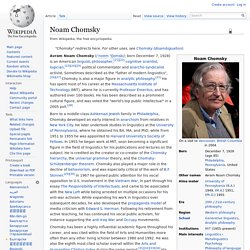
Sometimes described as the "father of modern linguistics",[26][27] Chomsky is also a major figure in analytic philosophy.[21] He has spent most of his career at the Massachusetts Institute of Technology (MIT), where he is currently Professor Emeritus, and has authored over 100 books. He has been described as a prominent cultural figure, and was voted the "world's top public intellectual" in a 2005 poll.[28] Born to a middle-class Ashkenazi Jewish family in Philadelphia, Chomsky developed an early interest in anarchism from relatives in New York City.
He later undertook studies in linguistics at the University of Pennsylvania, where he obtained his BA, MA, and PhD, while from 1951 to 1955 he was appointed to Harvard University's Society of Fellows. Early life Childhood: 1928–45. Medea Benjamin. The Los Angeles Times has described her as "one of the high profile leaders" of the peace movement and in 1999, San Francisco Magazine included her on its "power list" of the "60 Players Who Rule the Bay Area.
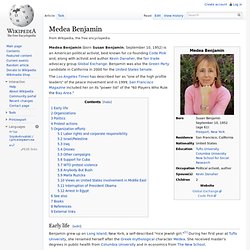
" Early life[edit] Benjamin grew up on Long Island, New York, a self-described "nice Jewish girl. "[1] During her first year at Tufts University, she renamed herself after the Greek mythological character Medea. Rebecca Adamson. Rebecca Adamson (born 1950)[1] is an American Cherokee businessperson and advocate.
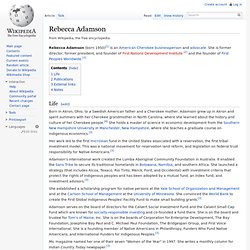
She is former director, former president, and founder of First Nations Development Institute [2] and the founder of First Peoples Worldwide.[3] Life[edit] Born in Akron, Ohio, to a Swedish American father and a Cherokee mother, Adamson grew up in Akron and spent summers with her Cherokee grandmother in North Carolina, where she learned about the history and culture of her Cherokee people.[4] She holds a master of science in economic development from the Southern New Hampshire University in Manchester, New Hampshire, where she teaches a graduate course on indigenous economics.[3] Her work led to the first microloan fund in the United States associated with a reservation, the first tribal investment model. This was a national movement for reservation land reform, and legislation on federal trust responsibility for Native Americans.[3]
Rigoberta Menchú. Rigoberta Menchú Tum (Spanish pronunciation: [riɣoˈβerta menˈtʃu], born 9 January 1959) is an indigenous Guatemalan woman, of the K'iche' ethnic group.
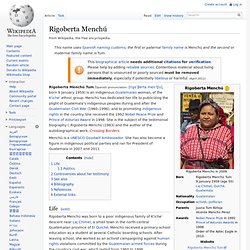
Menchú has dedicated her life to publicizing the plight of Guatemala's indigenous peoples during and after the Guatemalan Civil War (1960–1996), and to promoting indigenous rights in the country. She received the 1992 Nobel Peace Prize and Prince of Asturias Award in 1998. Naomi Klein. Cornel West. Subcomandante Marcos. Subcomandante Marcos or Subcomandante Insurgente Marcos is the nom de guerre used by the main ideologist, spokesperson and de facto leader of the Zapatista Army of National Liberation (EZLN), a Mexican rebel movement fighting for the rights of the indigenous peoples of Mexico.
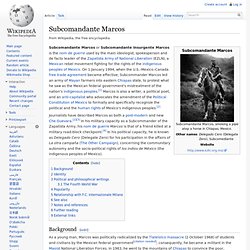
On 1 January 1994, when the U.S. Asmaa Mahfouz. Asmaa Mahfouz (Arabic: أسماء محفوظ, pronounced [ʔæsˈmæːʔ mɑħˈfuːz, ˈʔæsmæ-], born 1 February 1985) is an Egyptian activist and one of the founders of the April 6 Youth Movement.[1] She has been credited by journalist Mona Eltahawy and others with helping to spark mass uprising through her video blog posted one week before the start of the 2011 Egyptian revolution.[2][3] She is a prominent member of Egypt's Coalition of the Youth of the Revolution and one of the leaders of the Egyptian revolution.[4] In 2011, she was one of five recipients of the "Sakharov Prize for Freedom of Thought" awarded for contributions to "historic changes in the Arab world.
" The other joint recipients were Ahmed al-Senussi, Razan Zaitouneh, Ali Farzat and Mohamed Bouazizi of the Arab Spring. Arabian Business placed Mahfouz at #381 on its list of the World's 500 Most Influential Arabs.[5] Overview[edit] January 2011 uprising in Egypt[edit] If you think yourself a man, come with me on 25 January. See also[edit] Tank Man. Coordinates: "Tank Man" temporarily stops the advance of a column of tanks on June 5, 1989, in Beijing, in what is widely considered one of the iconic images of the 20th century.[1][2][3] This photograph (one of four similar versions) was taken by Jeff Widener of the Associated Press. The Tank Man, or the Unknown Protester, is the nickname of an anonymous man who stood in front of a column of tanks on June 5, 1989, the morning after the Chinese military had suppressed the Tiananmen Square protests of 1989 by force.
The man achieved widespread international recognition due to the videotape and photographs taken of the incident. Tank Man (now with more raw footage) Malala Yousafzai. Pakistani children's education activist and Nobel laureate Malala Yousafzai (Urdu: ملالہ یوسفزئی; Pashto: ملاله یوسفزۍ [məˈlaːlə jusəf ˈzəj];[2] born 12 July 1997),[1][2][3] often referred to mononymously as Malala, is a Pakistani activist for female education and the youngest Nobel Prize laureate.[4] She is known for human rights advocacy, especially the education of women and children in her native Swat Valley in Khyber Pakhtunkhwa, northwest Pakistan, where the local Pakistani Taliban had at times banned girls from attending school. Deng Fei goes beyond journalism to right wrongs in China.
Investigative reporter Deng Fei won plaudits and nearly 3 million Chinese microblog followers with a string of articles on sensitive topics such as child trafficking, organ harvesting from death-penalty victims, and shoddy school construction. Skip to next paragraph Deng Fei (l.) began an influential blog that encourages readers to contribute to solutions. His latest cause: better nutrition for some 26 million rural schoolchildren. Operation Free Lunch.
Angela Davis. Angela Yvonne Davis (born January 26, 1944) is an American political activist, scholar, and author. She emerged as a nationally prominent counterculture activist and radical in the 1960s, as a leader of the Communist Party USA, and had close relations with the Black Panther Party through her involvement in the Civil Rights Movement despite never being an official member of the party. Prisoner rights have been among her continuing interests; she is the founder of Critical Resistance, an organization working to abolish the prison-industrial complex. She is a retired professor with the History of Consciousness Department at the University of California, Santa Cruz, and is the former director of the university's Feminist Studies department.[2] Her research interests are in feminism, African-American studies, critical theory, Marxism, popular music, social consciousness, and the philosophy and history of punishment and prisons.
Early life[edit] Davis attended Carrie A. Cesar Chavez. Cesar Chavez (born César Estrada Chávez, locally: [ˈsesaɾ esˈtɾaða ˈtʃaβes]; March 31, 1927 – April 23, 1993) was an American farm worker, labor leader and civil rights activist, who, with Dolores Huerta, co-founded the National Farm Workers Association (later the United Farm Workers union, UFW).[1]
Paulo Freire. Paulo Reglus Neves Freire, Ph.D (/ˈfrɛəri/, Portuguese: [ˈpawlu ˈfɾeiɾi]; September 19, 1921 – May 2, 1997) was a Brazilian educator and philosopher who was a leading advocate of critical pedagogy. Martin Luther King, Jr.
Martin luther king, - wikipedia, t.. – shahrozasad
Poor People's Campaign. Martin Luther King. Mohandas Karamchand Gandhi. Mohandas Karamchand Gandhi (pronounced [ˈmoːɦənd̪aːs ˈkərəmtʃənd̪ ˈɡaːnd̪ʱi] ( ); 2 October 1869 – 30 January 1948) was the preeminent leader of Indian nationalism in British-ruled India. Employing nonviolent civil disobedience, Gandhi led India to independence and inspired movements for civil rights and freedom across the world. The honorific Mahatma (Sanskrit: "high-souled", "venerable"[2])—applied to him first in 1914 in South Africa,[3]—is now used worldwide.
He is also called Bapu (Gujarati: endearment for "father",[4] "papa"[4][5]) in India.